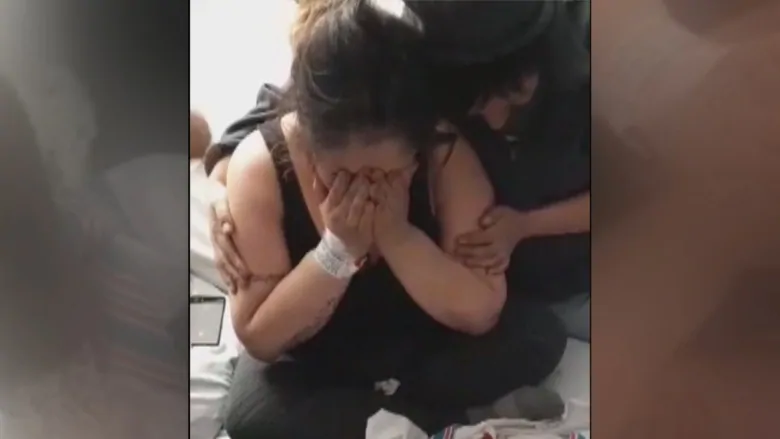Mother whose infant's seizure was live-streamed 'ecstatic' province ending birth alerts

A Manitoba mother whose baby girl was taken into the care of Child and Family Services shortly after she gave birth says she is glad the province has vowed to end the practice of issuing birth alerts.
Birth alerts are warnings from social services agencies to hospitals that label a mother as “high risk.” The alerts could lead to the newborn being taken away by Child and Family Services agents almost immediately after the child is born.
“I was ecstatic that it was going in the right direction,” the mother told CBC News. “I did not know they had [birth alerts] in place until we experienced that.”
CBC News is not naming the woman to protect her identity.
In January 2019, a live-streamed video showed the woman’s baby being taken away at the request of Child and Family Services — and displayed publicly the trauma suffered by a family being torn apart.
The video, which was viewed 559,000 times in two days, showed the woman cradling her newborn daughter, surrounded by relatives, before placing the baby in a car seat that Winnipeg police officers carried away.
Watch: Mother reacts to CFS workers apprehending newborn daughter:
“Walking down the hallway after she left, it was like a movie,” the mother said. “How did this happen, where I give birth to this baby, and it’s supposed to be a wonderful day in our lives. But then these people come and take that away.
“That’s just inhumane to do that to her, to do that to myself, to do that to my family, to do that culturally.”
Nearly 300 birth alerts issused
The video showed one of 340 babies one month old or younger taken into care in Manitoba in 2018-19.
There were 281 birth alerts issued between April and December 2019 — a 38 per cent drop compared to that same time a year prior, according to a provincial spokesperson.
Before that, however, the province estimates 500 birth alerts were issued each year, the spokesperson added.
“We are not able to separate out how many of these would have included Indigenous mothers or families, but we know that Indigenous women and children are disproportionately affected by this practice and that Indigenous children are over-represented in the child welfare system,” the spokesperson said in a statement to CBC News on Friday.
The baby girl was eventually returned to the family’s care in March 2019, after a child protection court granted a request to transfer custody from child welfare to the girl’s great-aunt — which the mother said she told to CFS was the original plan, prior to the baby being born.
Yet, the scars from the apprehension remain.
“It’s still hard to watch [the video],” the woman said. “When I was going through it, I didn’t understand the impact [the apprehension] had until a little while later… and just seeing how she’s affected, because she just hates going into car seats.”
‘It’s about time’
Mary Burton is a co-ordinator with Fearless R2W, a group in Winnipeg that teaches families about the CFS system. But she was also once a child in care.
“It’s about time,” Burton, a foster mother, said following the province’s announcement.
“Taking a baby away from a mother is one of the worst things you can do, especially one to three days after the baby is born because that’s when the mother is bonding with the child.”
Moving forward, Burton wants to see prevention measures implemented that help new or expecting families learn about risks and issues that come with raising a child, as well as resources that can help.
“They need to be able to teach these young people valuable life skills that they don’t have, or don’t know enough about,” she said.
Manitoba is now the second place in Canada to ban birth alerts; B.C. was the first to do it in September 2019.
Watch: Manitoba families minister explains why province is ending birth alerts:





